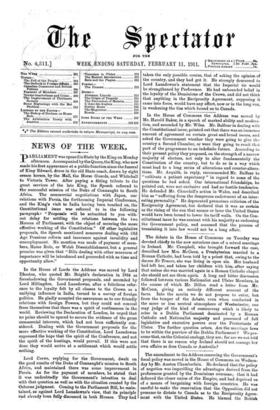In the House of Commons the Address was moved by
Mr. Harold Baker, in a speech of marked ability and modera- tion, and seconded by Mr. Wiles. Mr. Balfour in dealing with the Constitutional issue, pointed out that there was an immense amount of agreement on certain great and broad issues, and asked the Government whether they were going to give th,i country a Second Chamber, or were they going to remit that part of the programme to an indefinite future. According to their present policy they proposed, on the strength of a narrow majority of electors, not only to alter fundamentally the Constitution of the country, but to do so in a way which must lead to a long series of alterations and counter-altera- tions. Mr. Asquith, in reply, recommended Mr. Balfour to "cultivate a patient expectancy" in regard to some of the questions he bad asked. Our international friendships, he pointed out, were not exclusive and had no hostile tendencies. He defended Mr. Churchill's action in Wales, and described him as "suffering from the dangerous endowment of an inter- esting personality." He deprecated premature criticism of the Reciprocity Agreement, but declared that it was as certain as the rising of the sun that sooner or later the United States would have been bound to lower its tariff walls. On the Con- stitutional issue he was content with his majority as endorsing the Government policy, and assumed that the process of translating it into law would not be a long affair.


































